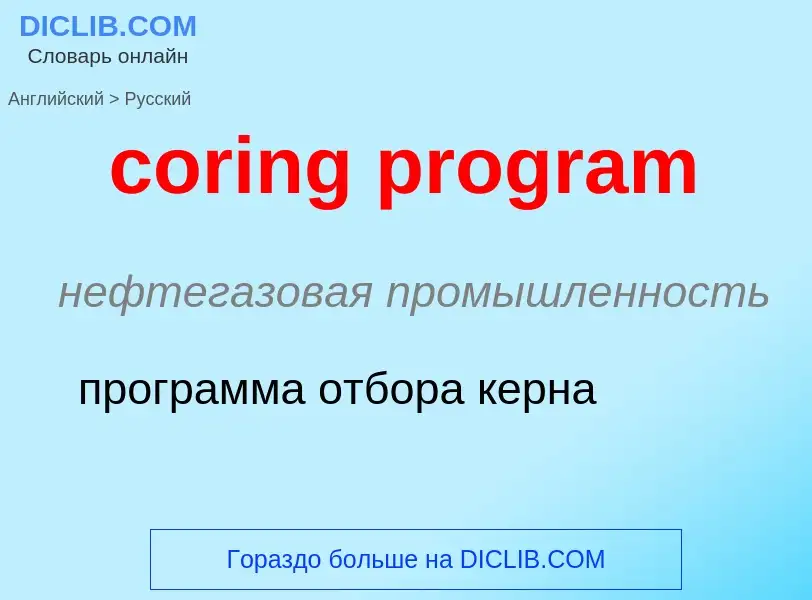Μετάφραση και ανάλυση λέξεων από την τεχνητή νοημοσύνη ChatGPT
Σε αυτήν τη σελίδα μπορείτε να λάβετε μια λεπτομερή ανάλυση μιας λέξης ή μιας φράσης, η οποία δημιουργήθηκε χρησιμοποιώντας το ChatGPT, την καλύτερη τεχνολογία τεχνητής νοημοσύνης μέχρι σήμερα:
- πώς χρησιμοποιείται η λέξη
- συχνότητα χρήσης
- χρησιμοποιείται πιο συχνά στον προφορικό ή γραπτό λόγο
- επιλογές μετάφρασης λέξεων
- παραδείγματα χρήσης (πολλές φράσεις με μετάφραση)
- ετυμολογία
coring program - translation to ρωσικά
нефтегазовая промышленность
программа отбора керна
Βικιπαίδεια

In machining, boring is the process of enlarging a hole that has already been drilled (or cast) by means of a single-point cutting tool (or of a boring head containing several such tools), such as in boring a gun barrel or an engine cylinder. Boring is used to achieve greater accuracy of the diameter of a hole, and can be used to cut a tapered hole. Boring can be viewed as the internal-diameter counterpart to turning, which cuts external diameters.
There are various types of boring. The boring bar may be supported on both ends (which only works if the existing hole is a through hole), or it may be supported at one end (which works for both, through holes and blind holes). Lineboring (line boring, line-boring) implies the former. Backboring (back boring, back-boring) is the process of reaching through an existing hole and then boring on the "back" side of the workpiece (relative to the machine headstock).
Because of the limitations on tooling design imposed by the fact that the workpiece mostly surrounds the tool, boring is inherently somewhat more challenging than turning, in terms of decreased toolholding rigidity, increased clearance angle requirements (limiting the amount of support that can be given to the cutting edge), and difficulty of inspection of the resulting surface (size, form, surface roughness). These are the reasons why boring is viewed as an area of machining practice in its own right, separate from turning, with its own tips, tricks, challenges, and body of expertise, despite the fact that they are in some ways identical.
The first boring machine tool was invented by John Wilkinson in 1775.
Boring and turning have abrasive counterparts in internal and external cylindrical grinding. Each process is chosen based on the requirements and parameter values of a particular application.

![A part's-eye view of a [[boring bar]]. A part's-eye view of a [[boring bar]].](https://commons.wikimedia.org/wiki/Special:FilePath/Boring bar 001.jpg?width=200)





![DEC]] [[VT100]] (1978) was a widely used [[computer terminal]]. DEC]] [[VT100]] (1978) was a widely used [[computer terminal]].](https://commons.wikimedia.org/wiki/Special:FilePath/DEC VT100 terminal transparent.png?width=200)
![Switches for manual input on a [[Data General Nova]] 3, manufactured in the mid-1970s Switches for manual input on a [[Data General Nova]] 3, manufactured in the mid-1970s](https://commons.wikimedia.org/wiki/Special:FilePath/Dg-nova3.jpg?width=200)

![[["Hello, World!" program]] by [[Brian Kernighan]] (1978) [["Hello, World!" program]] by [[Brian Kernighan]] (1978)](https://commons.wikimedia.org/wiki/Special:FilePath/Hello World Brian Kernighan 1974.jpg?width=200)


![Fran Bilas]] programmed the [[ENIAC]] by moving cables and setting switches. Fran Bilas]] programmed the [[ENIAC]] by moving cables and setting switches.](https://commons.wikimedia.org/wiki/Special:FilePath/Two women operating ENIAC (full resolution).jpg?width=200)
